|
|
|
Sort Order |
|
|
|
Items / Page
|
|
|
|
|
|
|
| Srl | Item |
| 1 |
ID:
111852
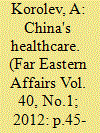

|
|
|
|
|
| Publication |
2012.
|
| Summary/Abstract |
Transition used to be seen as a unidirectional process: from plan to market, from public to private, from collective to individual. This research, on the contrary, focuses on the process of re-transition from over-marketization to a new form of state regulation in China's healthcare sector. Such process started in 2002 and included attempts to make provision of healthcare service a publicly funded industry.
The new reform in China's healthcare sector is presented as a process of development of four medical insurance nets, namely UEBMI, NCMS, URBMI and BMI for migrant workers, and their subsequent integration into a universal coverage plan adopted in March 2009. It is demonstrated that after more than 20 years of marketization, Chinese leaders attempt to reengage with healthcare sector and make it effective instrument of state building.
|
|
|
|
|
|
|
|
|
|
|
|
|
|
|
|
| 2 |
ID:
180870


|
|
|
| 3 |
ID:
085907
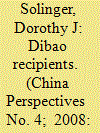

|
|
|
|
|
| Publication |
2008.
|
| Summary/Abstract |
After the Chinese leadership became cognizant of the negative social externalities of marketization-especially potential threats to its hallowed objectives of social stability and successful state enterprise reform-it initiated a novel welfare approach.
|
|
|
|
|
|
|
|
|
|
|
|
|
|
|
|
| 4 |
ID:
186802


|
|
|
|
|
| Summary/Abstract |
Beginning in the late 1970s in China, Deng Xiaoping shifted the Chinese Communist Party (CCP) line from revolution to reform, confining economic reform within the principles of socialism and communist party rule, with the political logic for party rule meant to prevail over the economic logic for economic development. However, as the reform proceeded, the CCP was led to concede to the economic logic. Even though the CCP set the building of a socialist market economy (SME) as the goal of economic reform, the actual reform path traversed not only marketization but also more importantly privatization. Throughout the shareholding reform of state-owned enterprises (SOEs), conversion of state-owned commercial banks (SOCBs) into stock companies, and the mixed ownership reform (MORs) of SOEs, the CCP had to accept the expansion of privatization for reasons of economic performance, despite the subsequent increase in ideological and political difficulties such would entail for regime identity and party rule, thus generating a political dilemma for the CCP.
|
|
|
|
|
|
|
|
|
|
|
|
|
|
|
|
| 5 |
ID:
171892


|
|
|
|
|
| Summary/Abstract |
This paper theoretically and empirically investigates whether acquaintance networks influence the deviation of land rent from the reference point advanced by Hart and Moore. The coefficient of variance and the range of land rent are used to represent the degree of deviation from the reference point. Based on village‐level data from the 2015 China Household Finance Survey, the estimated results indicate that land rent between acquaintances is more likely to significantly deviate from the reference point. Although rental transactions are conducted between acquaintances, larger deviations from the reference are also associated with a longer time to close deals. Our analysis using household‐level data further supports our findings, indicating that land rental markets embedded in the acquaintance networks of rural China are in a transition period and have characteristics of both relational and market orientation. The policy makers should introduce more outer village lessees or other market ingredients to increase the voluntary marketization of land rentals inside acquaintance networks.
|
|
|
|
|
|
|
|
|
|
|
|
|
|
|
|
| 6 |
ID:
114650
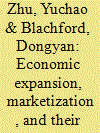

|
|
|
|
|
| Publication |
2012.
|
| Summary/Abstract |
Through a discussion of migration and employment situations in Xinjiang and
Tibet, this paper critically examines the social impact of China's recent economic
expansion and dynamic marketization on its ethnic minorities in the minority
regions of Xinjiang and Tibet.
|
|
|
|
|
|
|
|
|
|
|
|
|
|
|
|
| 7 |
ID:
179558


|
|
|
|
|
| Summary/Abstract |
North Korea today is a most unusual post-socialist state. Market actors and market prices are integral to economic life, but private property remains illegal, and private enterprise outside the household is de jure non-existent. In such an institutional context, some market processes are more autonomous in relation to the state, while others are more embedded within state structures. In this article, we offer a theoretical account of the shape that North Korea's market economy has taken, developed from a set of fishing industry case studies. We note four broad categories of enterprises: closely embedded, loosely embedded, semi-autonomous, and autonomous. By relative autonomy/embeddedness we mean control over fixed assets, cash flow, and operational decisions such as wage and price setting. We postulate three major determinants of embeddedness/autonomy: (1) relative strategic resource scarcity between state and market actors, (2) monitoring costs, and (3) institutional evolution that reflects these realities, though to varying extents.
|
|
|
|
|
|
|
|
|
|
|
|
|
|
|
|
| 8 |
ID:
192720
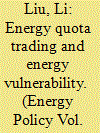

|
|
|
|
|
| Summary/Abstract |
Energy vulnerability has received sustained attention in global energy research related to energy security and poverty. However, energy quota trading (EQT), which aims to reduce energy consumption and intensity, has the potential to impact energy vulnerability substantially. This study scrutinizes the effect of EQT on energy vulnerability using a difference-in-difference model, relying on a quasi-natural experiment of China's EQT pilot. The findings show that EQT can significantly reduce energy vulnerability by 4.2%, which helps improve energy resilience. In addition, EQT can reduce the proportion of coal in energy consumption, thus reducing energy vulnerability. Finally, the ameliorating effect of EQT on energy vulnerability is particularly pronounced in areas with high resource dependence and low marketization. This research not only expands the understanding of the relationship between EQT and energy vulnerability, but also provides valuable assistance for future EQT policies from pilot to full-scale implementation.
|
|
|
|
|
|
|
|
|
|
|
|
|
|
|
|
| 9 |
ID:
192478


|
|
|
|
|
| Summary/Abstract |
Globalization, albeit no longer so global these days, affects children’s
values, self-images and world outlook through targeted marketing of
fairy tales, games and assorted media products. This article analyzes
these effects and proposes to those concerned a number of measures to
counteract them.
|
|
|
|
|
|
|
|
|
|
|
|
|
|
|
|
| 10 |
ID:
064211
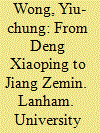

|
|
|
|
|
| Publication |
Lanham, University Press of America, 2005.
|
| Description |
xi, 361p.: tablepbk
|
| Standard Number |
076183074X
|
|
|
|
|
|
|
|
|
|
|
|
Copies: C:1/I:1,R:0,Q:0
Circulation
| Accession# | Call# | Current Location | Status | Policy | Location | IssuedTo | DueOn |
| 049804 | 951/WON 049804 | Main | Issued | General | | RF153 | 13-Aug-2023 |
|
|
|
|
| 11 |
ID:
159418


|
|
|
|
|
| Summary/Abstract |
Humanitarian nonprofit nongovernmental organizations (NGOs) today exhibit signs of “marketization” and behave like firms, according to a frequently uttered claim in the scholarly literature. However, it is not precisely clear what marketization and behaving like a firm mean. Drawing on the literature concerning nonprofit organizations and public administration, we offer a more sophisticated and multifaceted understanding of a consequential development for NGOs. Rather than merely equating “firm-like” with the adoption of corporate practices, we conceive of it as a mind-set. We suggest that “firm-like” involves not only marketization, but also corporatization and organizational rationalization. Based on a content analysis of the websites of a heterogeneous sample of nine humanitarian NGOs, we illustrate the potential of this conceptualization to shed light on a discourse among these organizations that appears to be self-referential and self-aggrandizing with respect to their capacities.
|
|
|
|
|
|
|
|
|
|
|
|
|
|
|
|
| 12 |
ID:
156465
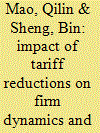

|
|
|
|
|
| Summary/Abstract |
This paper investigates the impact of trade liberalization on firm dynamics and productivity in the context of dramatic tariff reductions after China's accession to the WTO, and how this impact varies across regions with different marketization levels. Our results show that (a) on average, output tariff reductions tend to reduce firm entry rate and increase firm exit rate, while input tariff reductions help to increase both firm entry rate and exit rate, furthermore, regional marketization strengthens the impact of trade liberalization on firm dynamics; (b) trade liberalization exerts greater impact on the likelihood of exit for the least productive firms while it tends to reduce the probability of exit for the more productive firms, with regional marketization strengthening such a reallocation process of trade liberalization; (c) firm dynamics effect contributes approximately 43% of the growth of productivity, and it (especially the firm exit effect) is an important channel through which trade liberalization fosters productivity growth, and domestic market reform is found to strengthen such an impact.
|
|
|
|
|
|
|
|
|
|
|
|
|
|
|
|
| 13 |
ID:
140449
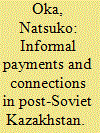

|
|
|
|
|
| Summary/Abstract |
In Soviet times, useful contacts had more value than money, and getting things done through unofficial channels of personal relations was a socially accepted norm. What changes have market reforms brought to Kazakhstan in these areas? This article details the use of informal payments and connections in Almaty and examines why non-monetary exchange of favours is increasingly being replaced by the immediate exchange of cash for assistance. This article argues that urban residents are becoming more inclined to quickly return a favour through cash and evade the lengthy exchanges involved in building reciprocal relationships, a practice widely accepted during Soviet times. This article also focuses on the importance of personal contacts in monetized exchange and demonstrates that cash payment is not a least preferred strategy for those who lack necessary networks. Urban residents in Kazakhstan in fact actively mobilize their personal networks to effectively and securely exchange monetary rewards.
|
|
|
|
|
|
|
|
|
|
|
|
|
|
|
|
| 14 |
ID:
146927


|
|
|
|
|
| Summary/Abstract |
Over the past 20 years scholars have repeatedly highlighted the complex relationship between conflict, peace and economics. It is today accepted that economic factors at the global, regional, national and local levels can promote conflict in various ways and that economic factors are therefore central in establishing a sustainable post-conflict peace. However, while the scholarly literature includes much nuance regarding the precise nature of these complex relationships, practices of peacebuilding are often far less nuanced. Instead there is a tendency to pin the hopes of fragile post-conflict states on establishing a liberalized and supposedly peace-promoting economy and a worrying absence of grounded assessments of the impacts of such policies. This article argues that the resulting lack of clarity regarding the local impacts of such peacebuilding mechanisms contributes to continued unwarranted enthusiasm for marketization among policymakers and practitioners. This issue is addressed directly by exploring the destabilizing and potentially conflict-inducing impacts of one foreign direct investment (FDI) project in rural Sierra Leone. The dominance of liberal approaches to economic policy within peacebuilding has recently combined with a surge in large-scale FDI projects, often labelled as ‘land-grabs’, which can be interpreted as a direct embodiment of the liberal peace paradigm. While the liberal peace assumes that such projects will help by paying taxes, rebuilding state capacity and employing idle young males, the article illustrates that among local populations such projects can be experienced as deeply disruptive and potentially conflict-promoting. It therefore describes four specific mechanisms by which the project in this setting endangers Sierra Leone’s still precarious transition to peace. The article concludes with recommendations for peacebuilding theorists, policy advocates and practitioners trying to navigate the difficult waters of post-conflict peacebuilding by way of large-scale FDI and marketization in general.
|
|
|
|
|
|
|
|
|
|
|
|
|
|
|
|
| 15 |
ID:
146460


|
|
|
|
|
| Contents |
Responses to the imposition of market-oriented economic policies have varied. This article asks two questions: (1) How can we better understand when marketization will or will not prompt resistance? And (2) when people do mobilize, why are some movements broad-based while others draw on particular segments of society? The author argues that these questions can best be answered by focusing not only on the political contexts and resources available to potential social movements, but also on what is perceived to be at stake during marketization. These perceptions influence mobilization processes and the kinds of groups available for mobilization. When people understand markets as threatening to material wellbeing, as well as to widely shared community relationships, understandings, and commitments, heightened feelings of group belonging can contribute to broad-based mobilization. The author develops this argument through analysis of the broad-based, widespread movement that emerged to protest water privatization in Cochabamba, Bolivia, in 1999 and 2000. In the context of a history of agriculture, irrigation, drought, and conflict, water helped to produce and reproduce imagined communities of nation, region, and ethnic group, as well as quotidian communities revolving around the routine production and consumption of water. These meanings help to explain the dynamics of the resistance that emerged.
|
|
|
|
|
|
|
|
|
|
|
|
|
|
|
|
| 16 |
ID:
178886
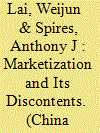

|
|
|
|
|
| Summary/Abstract |
Although the Chinese state has an outsized influence on shaping civil society in China, extant literature has generally overlooked the increasing role of the market in its non-governmental organization (NGO) development. This paper examines the marketization of Chinese civil society through an ethnographic investigation of funding relationships between domestic Chinese philanthropic foundations and grassroots NGOs. Two case studies of foundation venture philanthropy projects show that businesspeople, through their intensive involvement in foundation-led funding programmes, are introducing strong market influences to the non-profit sector. Notwithstanding the attraction of foundation funding, many NGOs decry the negative side effects of non-profit marketization. We argue that NGOs in this context risk being transformed into social product providers and resource-chasing machines, detracting from the self-directed social missions that many NGO leaders see as their original calling. These observations on emergent NGO–foundation relationships also reflect participants’ increasing uncertainty about the direction of Chinese civil society development.
|
|
|
|
|
|
|
|
|
|
|
|
|
|
|
|
| 17 |
ID:
186004
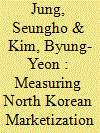

|
|
|
|
|
| Summary/Abstract |
Since the traditional central planning system virtually collapsed in the 1990s, growth of marketization has become the most prominent feature of the North Korean economy. In this article, we evaluate the development of de facto and de jure marketization of the 2000s in three dimensions of price liberalization, privatization, and financial system development. Accordingly, we construct a marketization index using the survey results of North Korean refugees and expert evaluations of the North Korean economy. The marketization level generally increased over the years despite the unfavorable foreign and domestic environments such as international sanctions and the anti-market polices of the mid-2000s. Among the three evaluation categories, price liberalization has advanced the most, whereas financial system development has developed the least. In particular, de facto privatization has rapidly expanded since Kim Jong Un came into power. However, from the economic reform perspective, the overall institutionalization level of the informal economy in North Korea still remains low compared to those of former socialist economies.
|
|
|
|
|
|
|
|
|
|
|
|
|
|
|
|
| 18 |
ID:
160385
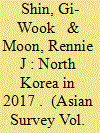

|
|
|
|
|
| Summary/Abstract |
Kim Jong Un continued to consolidate his power through personnel changes, and North Korean society saw increasing consumerism, along with signs of growing inequality. The economy did well through early 2017 but the subsequent effects of sanctions remained uncertain. North Korea conducted its first test of an intercontinental ballistic missile and its sixth nuclear test, triggering heated debate in the US and elsewhere about how to respond. Kim clearly is not going to give up working on weapons of mass destruction.
|
|
|
|
|
|
|
|
|
|
|
|
|
|
|
|
| 19 |
ID:
114791
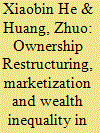

|
|
|
|
|
| Publication |
2012.
|
| Summary/Abstract |
This paper proposes a property transformation perspective to examine the mechanisms of wealth accumulation and wealth inequality creation during China's post-1978 transformation. It examines how enterprise ownership restructuring, marketization and state politics have resulted in greater wealth inequality between cadres and ordinary workers, between public sectors/organizations and private sectors/organizations. Mainly drawing on data from the Chinese Household Income Project conducted in 1995 and 2002, we find that the property transformation process has created greater wealth disparity among different occupational groups and among those working in different work organizations since the mid-1990s. However, it is inconclusive whether non-housing wealth or total household wealth are increasing at the same pace across different occupations and work organizations with the growing market penetration and the spread of privatization.
|
|
|
|
|
|
|
|
|
|
|
|
|
|
|
|
| 20 |
ID:
115723
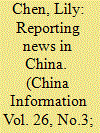

|
|
|
|
|
| Publication |
2012.
|
| Summary/Abstract |
This article applies the techniques of critical discourse analysis (CDA) to an examination of the Chinese government-owned English-language newspaper the China Daily. The aim is to see whether there is evidence that over the last decade the newspaper, which describes itself as the overseas 'Voice of China', has attempted to adapt its style of reporting in response to China's raised international profile, as well as to the increasing diversity and commercialization of its media industry. The study adopts a quantitative and qualitative approach to the analysis of two corpora of texts from the newspaper: one from 1998 and the other from 2010. The focus is on what Labov calls evaluation: an aspect of the narrative structure of a text that has to do with the way the narrator embellishes a narrative to make it more interesting. The results suggest that the China Daily has made its reporting more diverse and interesting, probably in response to the commercialization of China's media industry and to China's growing international profile.
|
|
|
|
|
|
|
|
|
|
|
|
|
|
|
|
|
|
|
|
|